Solving medical training challenges, present and future
Learn about how ORamaVR and VirtaMed AG successfully tackled medical training challenges with VIVE
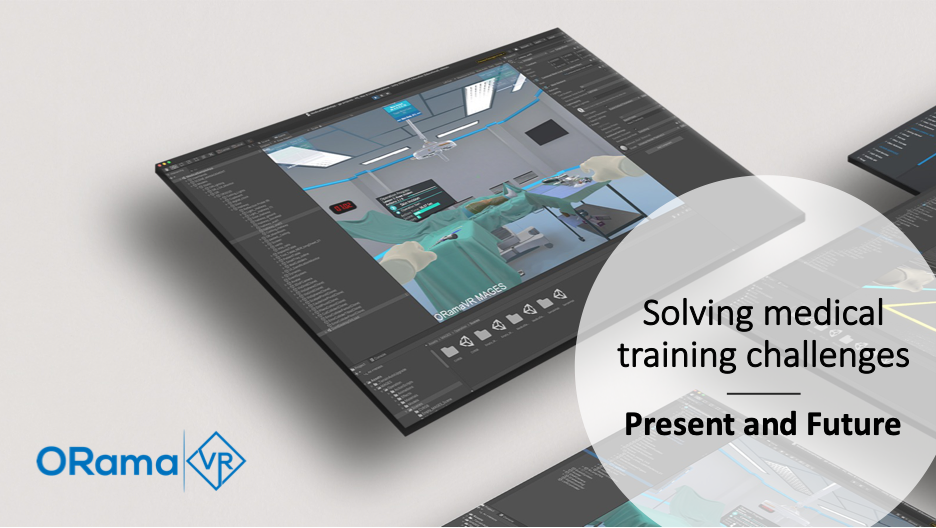
Healthcare | Training/Simulation
5 minutes read
March of 2020, the Covid-19 pandemic resulted in a suspension of most non covid related clinical activities worldwide. Also, medical training in health institutions and medical schools on real patients or simulation centers was largely restricted or simply impossible, worsening the already existing crisis of lacking number of doctors and medical teams. According to WHO, there will be a projected shortage of 18 million health workers by 2030 [1] .
With the pandemic, healthcare and training institutions around the world were seeking ways to resume the training activities [2] . It became obvious that the usual means would not work and that it was important to embrace novel technologies that could provide relief to the dire situation. Virtual Reality and Augmented Reality technology is clearly a solution that allows medical staff to train in life-like situations, anywhere, anytime, alone or with others, guided by the solution or by a remote expert teacher, and far more [3] as proven by several clinical and pilot studies. [4]
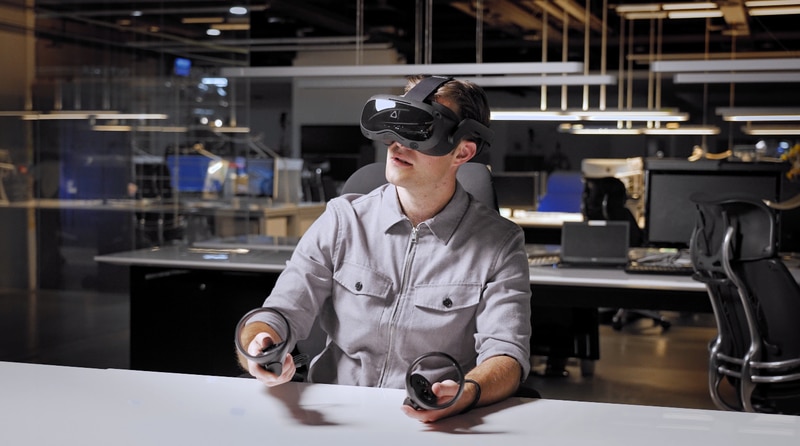
Swiss medical device company VirtaMed AG
[5]
, a world leader in providing medical simulation training and digital twin solutions for training of healthcare professionals outside of the operating room, were confronted with the same reflection.
VirtaMed believes in delivering excellent training solutions and strives to change the world of surgical education to the better. During the Covid-19 crisis, VirtaMed training solutions were delivered through moving Simulation Labs, the VirtaMedED Truck. Although an efficient alternative, due to the border restrictions, they were not able to train the increasing number of residents as prior the pandemic restrictions. To solve the accessibility and training availability problem, VirtaMed decided to include VR to their product line. As they continuously strive to deliver high-end training solutions to their customers, they seeked a partner who provided a VR Kit to build their training solutions on.
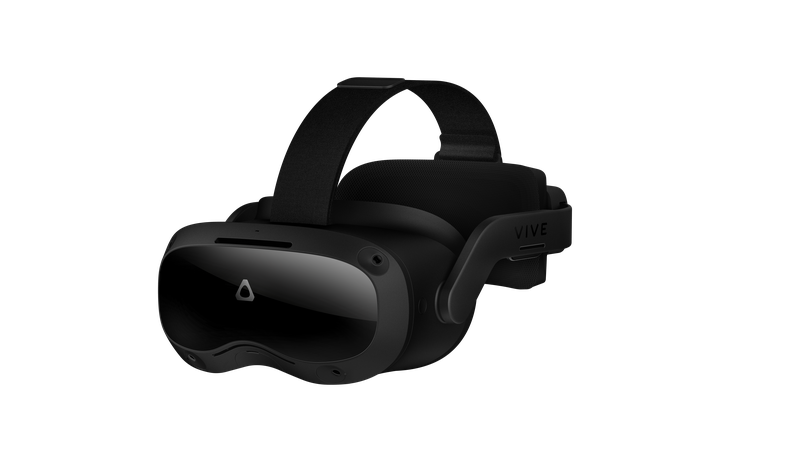
That is when VirtaMed became aware of Geneva based ORamaVR [6] that develops and markets MAGES SDK [7] , the world’s most advanced medical VR training software development kit (SDK). After a first presentation and a first test, the decision to adopt MAGES SDK was obvious.
MAGES SDK is the first SDK that allows rapid prototyping of any shared, collaborative, networked medical operations in VR, in a fraction of time and cost. Using this medical VR tailored toolset from OramaVR, health organizations, medical device companies, even small VR content producers can create best-in-class VR content and focus on the training and not on technology. While making the creation of medical VR simulations accessible, MAGES SDK also future proofs simulations by enabling the user to extend, modify, maintain them at any time in the future without needing third party intervention.
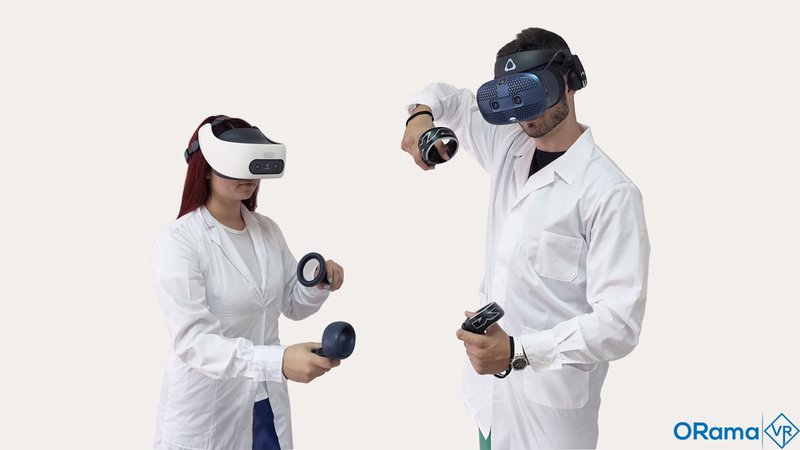
Adopting MAGES SDK has made it very easy to create high quality, interactive, VR scenarios, enabling VirtaMed to use their existing assets in a brief amount of time. Using MAGES SDK as a technology foundation, means that VirtaMed can focus on delivering quick high-end training solutions to their customers and global training partners. The development team at VirtaMed successfully created their newest medical VR simulation in only a few weeks, running on both HTC’s VIVE Focus 3, HTC Vive Cosmos and any other VR headset.
Paradigm shift to competence oriented and didactically high-quality simulator-supported training
Further to extending VirtaMed’s offering to immersive Virtual Reality, visionary Stefan Tuchschmid, PhD, co-CEO and founder of VirtaMed AG, together with select partners, had been working on a futuristic project called “PROFICIENCY”. The idea is to initiate a paradigm shift in practical training in surgery, away from primary training in the operating room, towards standardized and proficiency-based surgical training curricula.
Seeing the technological advance MAGES SDK is providing and building on the positive experience working with ORamaVR, and seeing the strategic alignment with ORamaVR, Stefan Tuchschmid decided to invite ORamaVR to become a full partner of the project consortium that includes the Cantonal Hospital of St.Gallen, Lausanne University Hospital (CHUV), the University of Zurich with Balgrist University Hospital, ETH Zurich and Zurich University of Applied Sciences (ZHAW), as well as the companies VirtaMed AG, Microsoft Schweiz GmbH, ORamaVR S.A. and Atracsys LLC.
Being endorsed by the Swiss College of Surgeons, the Swiss Orthopaedics and the Swiss Surgeons expert associations, “This flagship innovation project brings together the necessary medical, pedagogical and technical expertise to create the most advanced and comprehensive surgical training curriculum ever developed,” said Stefan Tuchschmid, PhD, co-CEO and founder of VirtaMed.
“With the ‘PROFICIENCY’ project, we want to advance simulator-based continuing education in surgery," explains Prof. Bruno Schmied, M.D., Chief of Surgery at the Cantonal Hospital of St. Gallen. "The innovative continuing education program – analogous to the training and continuing education of pilots on flight simulators – will decisively improve surgical continuing education in open and minimally invasive surgery and initiate the desired paradigm shift to competence-oriented and didactically high-quality simulator-supported training."
The Swiss Federal Agency for Innovation Promotion (Innosuisse) is supporting the “PROFIENCY” project along with its corporate partners with a budget of CHF 12 million over four years [8] .
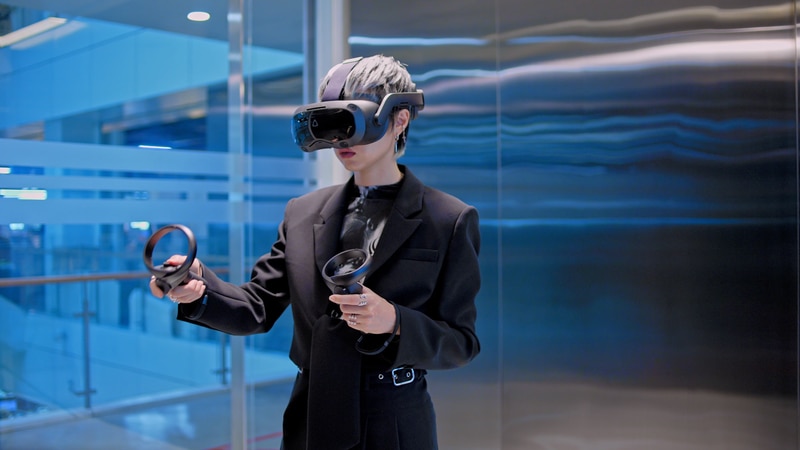
In a first decisive step, the project envisages the development of a modular curriculum that is tailored to the requirements of surgical societies and placed on a digitally accessible learning platform. This standardized, evidence-based and performance-oriented training program will be taught using the latest didactic methods and empower surgeons to acquire skills through self-paced learning.
In a second major step, the consortium will develop innovative training tools for simulating different surgical situations, ranging from online virtual reality simulation, augmented box trainers, high-end simulators, to augmented-reality-enabled open surgery and immersive remote operation room participation. These simulation tools will be connected to the learning platform, which enables to build a training and learning program network, ready for the first trainings. The more trainees work on this network the better the entire training and learning program becomes and enables proficiency-based training.
Prof. George Papagiannakis, CEO/CTO and co-founder of ORamaVR says “This is just the beginning of a new era in medical training and care systems. With the use of virtual and augmented reality, healthcare can be made more affordable and increase outreach to millions of individuals. Covid-19 revealed the weaknesses of medical education systems globally and exposed some of its most gaping problems. Regardless of the outcome of the pandemic, ORamaVR, supported by HTC, will together with VirtaMed and its partners lead the way to transform medical training via VR and will be solving the current weaknesses of the medical education systems. VR will help to improve patient care, a universal benefit for all.”
[1] Health workforce (who.int) Published clinical and pilot studies:
[2] The impact of the COVID-19 pandemic on medical education | British Journal of Hospital Medicine (magonlinelibrary.com)
[3] VIVE_Case_Study_ORamaVR.pdf
[4] Published clinical and pilot studies:
- Frontiers | Virtual Reality Medical Training for COVID-19 Swab Testing and Proper Handling of Personal Protective Equipment: Development and Usability | Virtual Reality (frontiersin.org)
- JMIR Serious Games - Effectiveness and Utility of Virtual Reality Simulation as an Educational Tool for Safe Performance of COVID-19 Diagnostics: Prospective, Randomized Pilot Trial
- JMIR Serious Games - Α Virtual Reality App for Physical and Cognitive Training of Older People With Mild Cognitive Impairment: Mixed Methods Feasibility Study
- Virtual Reality Simulation Facilitates Resident Training in Total Hip Arthroplasty: A Randomized Controlled Trial - ScienceDirect
[5] VirtaMed | Medical education with virtual reality simulators
[6] Accelerating the world’s transition to medical VR training (oramavr.com)